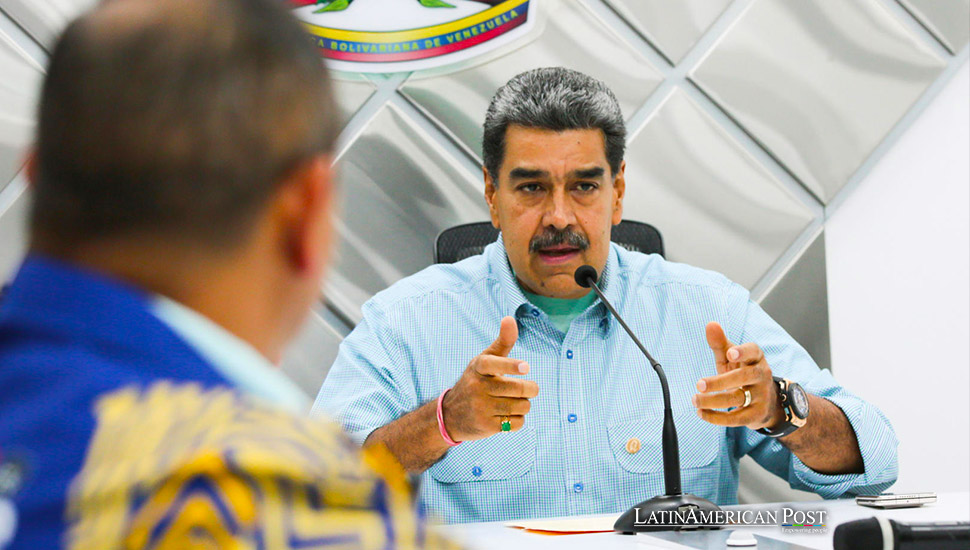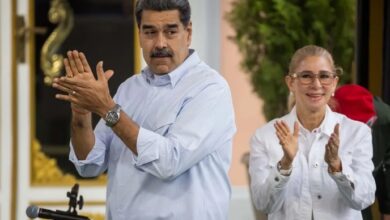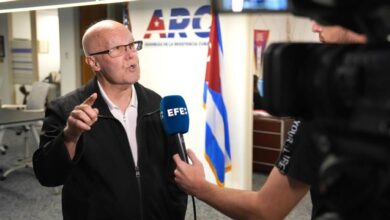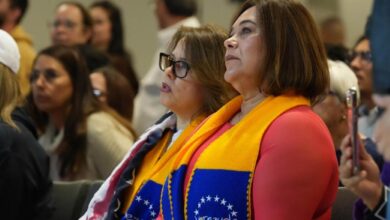How Maduro is Turning October into a Fake Christmas Amid Crisis

As Venezuela grapples with political chaos and economic collapse, President Nicolás Maduro has decided to bring Christmas early—starting in October. But is this festive move about spreading cheer or another distraction from the country’s deepening crisis?
When the going gets tough, the tough get…Christmas decorations? At least, that’s the strategy Venezuelan President Nicolás Maduro seems to be embracing as his nation spirals further into political chaos and economic despair. With a presidential election mired in controversy, an arrest warrant out for the opposition candidate, and international condemnation raining down on his regime, Maduro has found the perfect solution to Venezuela’s woes: move Christmas up to October. Because if there’s one thing that can solve systemic corruption, rampant inflation, and human rights abuses, it’s a Santa Claus parade two months early.
‘Tis the Season…in October: Maduro’s Latest Holiday Decree
Imagine this: it’s the middle of September, the sun is blazing, and instead of pumpkin spice lattes, you’re suddenly bombarded with Christmas carols blaring from every corner. Welcome to Venezuela, where President Maduro, in his infinite wisdom, has decreed that Christmas will begin on October 1st. “It’s September, and it already smells like Christmas,” Maduro announced during his weekly television show, presumably while inhaling deeply from a nearby cinnamon-scented candle.
This isn’t Maduro’s first decision that the traditional holiday season needs a little tweak. He’s pulled similar stunts in previous years, like declaring an early Christmas during the COVID-19 pandemic—when everyone needed an excellent old-fashioned gift exchange, complete with masks and social distancing. But even by Maduro’s standards, kicking off Christmas before Halloween has had a chance to flex its spooky muscles is a bold move.
It’s almost as if Maduro believes that by slapping a few festive lights on the streets of Caracas, he can distract the population from the fact that their monthly minimum wage is a whopping $3.55. But why focus on economic reform when you can find the perfect spot for the nativity scene?
Christmas Cheer or Political Distraction?
Maduro claims that his early Christmas decree is a “tribute” to the Venezuelan people, a gesture of gratitude for their continued support (read: tolerance) of his leadership. He promised that the holiday season would come “with peace, happiness, and security”—a tall order considering Venezuela’s current state of affairs. After all, there’s nothing like the warmth of the holiday spirit to make you forget about the political prisoners and the fact that the ruling party just declared itself the winner of a highly contested election without, you know, actually showing any results.
Of course, this raises the question: Is Maduro trying to spread Christmas cheer, or is this just another attempt to distract the population from the harsh realities they face daily? It’s a classic case of “bread and circuses,” except there’s no bread, and the circus is just a bunch of empty promises wrapped in a red-and-green bow.
As the international community continues to condemn Maduro’s government for its lack of transparency and its persecution of political opponents, it’s hard not to see this early Christmas as a cynical ploy to divert attention from the real issues. After all, what better way to avoid questions about electoral fraud than by filling the airwaves with jingle bells?
How to Celebrate Christmas on $3.55 a Month
Let’s get one thing straight: Christmas is a time for giving. But what exactly are you supposed to give when your monthly wage barely covers the cost of a single Christmas ham? This is the reality for many Venezuelans, who are expected to partake in the holiday festivities on a budget that wouldn’t even cover the cost of a Christmas tree in most parts of the world.
The minimum wage in Venezuela has remained stagnant at 130 bolivars per month, which translates to about $3.55. For those lucky enough to receive government benefits, there’s an additional food assistance bonus of around $40 and a special bonus of $90. But even with these “bonuses,” the average Venezuelan is far from financially equipped to celebrate Christmas meaningfully. So, what’s the plan? Gather the family around a pile of IOUs and wish for a better exchange rate in the new year.
Maduro’s early Christmas decree only highlights the absurdity of the situation. While he’s busy waxing poetic about the joys of the holiday season, millions of Venezuelans are struggling to put food on the table, let alone buy gifts or decorations. At least they’ll have two extra months to admire the lights Maduro will undoubtedly string up around the presidential palace.
The Gift That Keeps on Giving: Arrest Warrants and Holiday Arrests
In true festive fashion, Maduro’s government decided to kick off the holiday season with a few extra “gifts” for the opposition. Just hours before Maduro’s Christmas proclamation, a Venezuelan judge issued an arrest warrant for Edmundo González, the former opposition presidential candidate. González is accused of various crimes, including conspiracy, falsifying documents, and usurpation of powers—because nothing says “season of giving” like trumped-up charges against your political rivals.
Since the controversial election, protests against Maduro’s rule have erupted across the country, with the government responding in its usual heavy-handed manner: mass arrests. Over 2,000 people, including journalists, politicians, and aid workers, have been detained in the aftermath, proving that Maduro’s promise of “peace and security” comes with a hefty dose of repression.
As the government cracks down on dissent, it’s hard not to see the early Christmas decree as part of a broader strategy to pacify the population. By wrapping himself in the mantle of holiday cheer, Maduro can present himself as a benevolent leader while tightening his grip on power. It’s a move that would be laughable if it weren’t so transparent—and if it weren’t happening in a country where the stakes are so high.
Ultimately, Maduro’s early Christmas may briefly distract from Venezuela’s crisis, but it won’t change the underlying issues. The political tensions, economic hardships, and human rights abuses that plague the country cannot be solved with a few extra weeks of holiday music and tinsel. But for Maduro, it’s all about maintaining control, even if it means playing Santa Claus in October.
The Grinch Who Stole October
As Venezuela grapples with the fallout from a contested election and an ever-worsening economic crisis, President Nicolás Maduro’s decision to declare an early Christmas is nothing short of a farce. While the rest of the world watches in disbelief, Maduro continues to play the role of a benevolent leader, offering the Venezuelan people the “gift” of an extended holiday season—one that they can barely afford to celebrate.
In the end, Maduro’s early Christmas is just another example of how a dictator can manipulate even the most cherished traditions to serve his ends. By turning Christmas into a political tool, Maduro is not just undermining the holiday’s true meaning—he’s also highlighting the absurdity of his rule. But for the people of Venezuela, who must endure another year of hardship under his regime, there’s little to laugh about.
So, as the lights go up in Caracas and the holiday music starts to play, it’s worth remembering that this early Christmas is less about celebrating the season and more about distracting from the harsh realities of life in Venezuela. For Maduro, it’s just another day in the office; for the Venezuelan people, it’s yet another reminder of the lengths their leader will go to maintain his grip on power. And that, more than anything, is the real Grinch who stole October.





